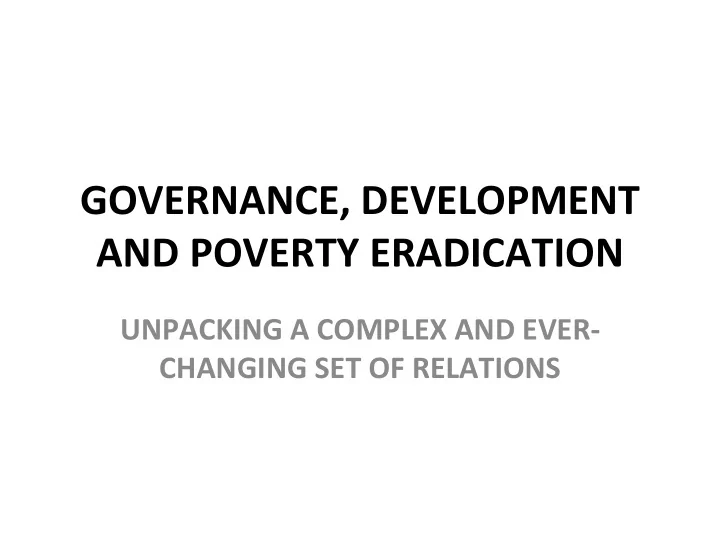

GOVERNANCE, DEVELOPMENT AND POVERTY ERADICATION UNPACKING A COMPLEX AND EVER ‐ CHANGING SET OF RELATIONS
THE PREMISE • Development is more than poverty eradication • Poverty eradication is a contested concept and practice • Governance is the critical process variable that determines results
SHIFTS IN UNDERSTANDING: Governance • Prerequisite of development or not? • Political rather than managerial • Country ‐ led rather than externally driven • Institutional reforms or structural changes • Political economy analysis rather than just policy analysis
SHIFTS IN UNDERSTANDING: Development • From technocratic policy design to understanding local contexts • From comparison between countries to comparison over time • From external agenda ‐ setting to national ownership • From model ‐ driven to problem ‐ driven approach
SHIFTS IN UNDERSTANDING: Poverty eradication • From bureaucracy to market intervention • From North ‐ South to South ‐ South exchanges • From supply ‐ driven to demand ‐ driven approaches
DETERMINANTS OF POVERTY Centres on two dimensions: • Systemic • • • Social Economic • Exclusion Alienation • • State Market • Social Informal • Isolation coping • • • • Environmental •
SYSTEMIC RATIONALITY • A prerequisite for sustainable poverty eradication • A disembedded approach based on objective rather than subjective factors • Actors obey rules and let office obligations take precedence over personal ones • Citizens and officials alike share a universalist ethic
DIFFERENT MANIFESTATIONS OF POVERTY • Social exclusion where system is in place and is dominated by state bureaucracy • Economic alienation where system is in place and is dominated by the market • Social isolation where non ‐ systemic factors prevail and state is dominant but not functional • Informal coping where non ‐ systemic factors prevail and market is dominant but not functional
LESSONS LEARNT • Policy works where systemic rationality is in place but falters where it is not • Universal policy prescriptions do not get traction • Externally driven policy goals easily lead to overcommitments that cannot be sustained • Must build systems from within rather than through external institutional transfers
POLICY RECOMMENDATIONS • To complete a new development narrative, the following principles need to be adopted : Build on demand Cater for local not central government bodies Avoid encouraging patronage politics Encourage professional management • Move away from the ”easy” poverty eradication in the rural areas to the more complex and sensitive poverty eradication in the cities
Recommend
More recommend